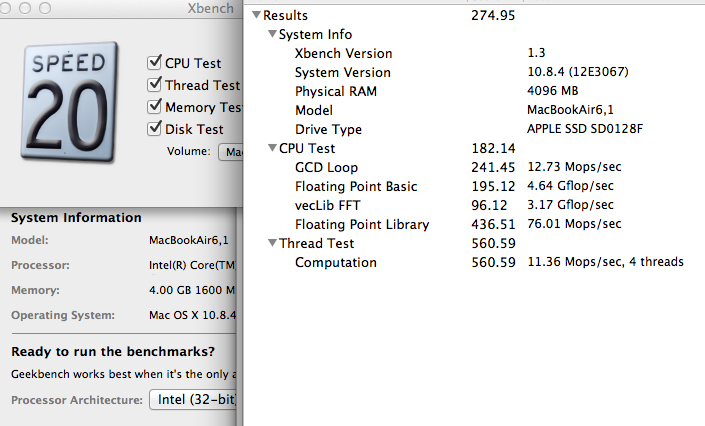
\t\tSpinning Squares\t7.23\t5.06 frames/sec \t\tFloating Point Library\t54.53\t2.45 Mops/sec Well, this tangerine machine is soon to be history. Is it a typo for your OpenGL test value = 7.23? Mine is 22.45. Something is terribly wrong with that OpenGl scoreĭrumbug1, I'm on the 333 boat as well. \t\tFloating Point Library\t76.38\t3.43 Mops/sec \t\tFloating Point Library\t93.16\t4.18 Mops/sec \t\t\tL1 Cache\t\t32K (instruction), 32K (data) Uncached Readė5.19đ3.800 Mhz FP iMac G4, 256 MB Ram.Superdrive.100 Mhz Bus Lock ContentionĖ7.02Ē.88 Mlocks/sec, 4 threads

I will be sure to return to this thread and post results for you as I start upgrading this mini.įloating Point Basicē9.38ę35.71 Mflop/secįloating Point LibraryĔ3.49ė.57 Mops/secĬomputationĖ0.60đ.23 Mops/sec, 4 threads In fact a lot of people in the past would use ram drives to jack their scores up. One of the things I remember that will drastically change your score is the harddrive speed. Here you go clean - I ran xbench again this morning. Just run the benchmark and post your score and get on with it! It's not the final score you should focus on but the individual scores that each category gets. I compare it to what other macs I have used have scored. What the benchmark is good for is just a general comparison. (my Digital Audio G4 Tower 1.2ghz which I since sold scored close to 80 on this benchmark, and like 140 on the older rating system of the benchmark)
XBENCH TEST UPGRADE
My first upgrade will be a much faster harddrive. It's a bit slow, but it's a single G4 and it has a slow harddrive. (which I just bought today from someone for only $250.00 )
XBENCH TEST MAC
Uncached Readė5.55đ4.02 MB/sec Īfter the very first run on a Mac Mini 1.42ghz. Lock ContentionĖ5.16Ē.80 Mlocks/sec, 4 threads Because, honestly, how often do you apply a 100 pixel gaussian blur on your digital photos?įloating Point Basicē6.92Ę77.33 Mflop/secįloating Point LibraryĔ3.50ė.57 Mops/secĬomputationĖ0.58đ.23 Mops/sec, 4 threads There is no point in running testing a bunch of Photoshop filter that you'll never use. And only run the tests that are actually of importance to you. The ONLY good way to benchmark is to run the applications YOU will run, in situations similar to the ones you'll put your computer in. The fact that one computer is ten times faster than another one at Photoshop, even if we disregard Rosetta, does not mean diddlysquat if you never run Photoshop. There is no such thing as "general computing performance." All there is, is how well a certain computer performs at a certain task. So why is it that a 20" Intel iMac gets a UI test score of 20, which is about as much as the iBook G4?

And one even bigger problem with it: Intel Macs always get shitty UI scores in Xbench, despite the fact that it's common knowledge that the Intel Macs "feel" a whole lot faster in terms of UI speed. Things like the vecLib FFT test are not really comparable between the Intel Macs and the PowerPC Macs. And only sometimes, at that: Xbench's results are often pretty varying even on the same hardware.Īnother problem with it is how it works. All it will tell you is that it will run Xbench better. The fact that computer A beats computer B at Xbench does NOT mean it will be faster at Safari, or Photoshop, or Doom 3, or anything else for that matter.

All it does is tell you how well the computer runs Xbench. The problem with something like Xbench is that it doesn't tell you anything vital. I guess you should run a bunch of Photoshop benchmarks, or something. Click to expand.You mean that doesn't suck? None, really.


 0 kommentar(er)
0 kommentar(er)
